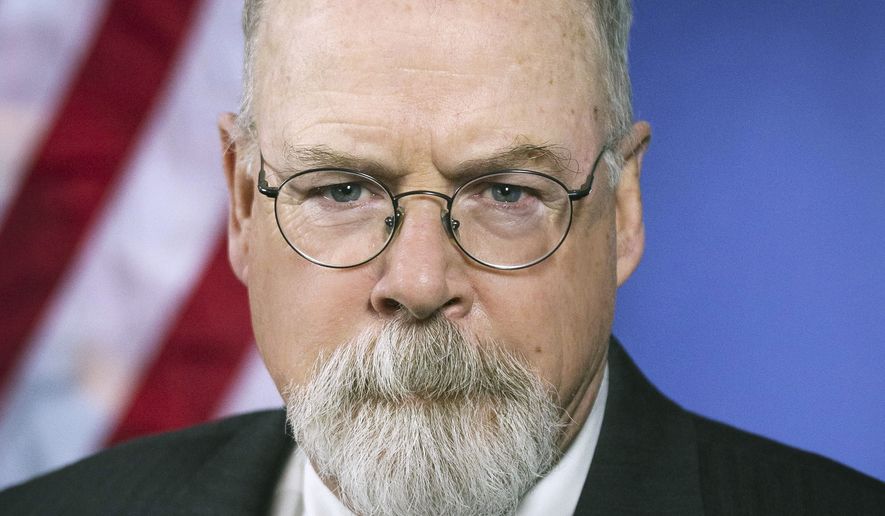Special counsel John Durham says he’s not responsible for how the media covered last weekend’s allegation that Hillary Clinton’s presidential campaign was linked to tech experts spying on former President Donald Trump’s servers at his residences and the White House.
Mr. Durham said it’s “simply not true” that his goal was to inflame media coverage.
The special counsel’s statements were in a court filing last week that responded to a motion from defense attorneys for Michael Sussmann, a lawyer with ties to the Clinton campaign who has been charged in the special counsel’s probe into the origins of the FBI’s Trump-Russia collusion investigation.
Mr. Durham said he had “valid straightforward reasons” for including the spying allegations in a Feb. 11 filing alleging that Mr. Sussmann’s attorneys had a conflict of interest.
“If third parties or members of the media have overstated, understated or otherwise misinterpreted the facts contained in the government’s motion, that does not in any way undermine the valid reasons for the Government’s inclusion of this information,” Mr. Durham wrote in the court filing.
Even as Mr. Durham disavowed responsibility for the flurry of stories his filing spurred this week, he pledged that he will make future filings under seal if “the potential exists that such facts could garner media attention.”
He also argued that allegations were central to proving Mr. Sussmann’s alleged criminal conduct, but did offer a further explanation.
Mr. Sussmann is charged with lying to the FBI when providing tips about alleged links between Mr. Trump and Russia.
In a court filing Saturday, Mr. Durham alleged that an unnamed tech executive and his associates exploited domain name system (DNS) internet traffic from an unknown health care provider, Trump Tower, Mr. Trump’s Central Park West apartment, and the executive office of the president of the United States.
The purpose of mining the DNS traffic was for “gathering derogatory information about Donald Trump,” Mr. Durham wrote.
The allegations touched off a flurry of news stories and Republican lawmakers demanding more details about the role the Clinton campaign played in the surveillance effort.
House Minority Leader Kevin McCarthy, California Republican, pledged investigations into exactly what happened if the GOP takes control of Congress in the November elections.
Rep. Jim Jordan of Ohio, the top Republican on the Judiciary Committee, said the filing proved Mr. Trump’s claim that he was being illegally spied on, adding “it was worse than we thought because they were spying on the sitting president of the United States.”
Left-leaning newspapers and columnists went to work trying to rebut Mr. Durham’s filing. After ignoring the story for a few days, several outlets published articles alleging Republicans overhyped the story.
The Washington Post ran a “fact check” column saying the Durham filing “says much less than what Trump claims.” The New York Times ran a “news analysis” late Monday that scolded “right-wing outlets” for promoting “alarmist claims” and dismissed coverage of the bombshell filing as “mostly wrong or old news.”
The article said the narrative involved “dense and obscure issues” that required so much mental energy, it raised the question of whether news outlets should even cover Mr. Durham’s claims.
Mr. Sussmann, who has pleaded not guilty to the charge of lying to the FBI, used the media uproar to argue that his case should be dismissed.
On Thursday, Mr. Sussmann’s attorneys said that Mr. Durham included unnecessary and misleading information in his filings “plainly intended to politicize this case, inflame media coverage and taint the jury pool.”
They also argued that the case is “prosecutorial overreach,” and insisted their client did not lie to the FBI, but if he did, it was an “ancillary matter” that did not impact its decision to investigate Mr. Trump.
Mr. Sussmann is accused of not disclosing to FBI officials that he was working for Mrs. Clinton’s 2016 presidential campaign when bringing them tips of a Trump-Russia link.
During the September 2016 meeting with then-FBI general counsel James Baker, Mr. Sussmann told the bureau about alleged secret communications between the Trump campaign and a Russian bank.
Those suspicions were later determined to be unfounded.
Within days, a story about the FBI investigating Trump’s back-channel to the Russian bank showed up in major newspapers.
In his indictment, Mr. Durham said Mr. Sussmann’s alleged failure to disclose his ties to the Clinton campaign was material because it misled the FBI “about the political nature of his work.”
Mr. Durham said that had the FBI known that Mr. Sussmann was billing the Clinton campaign for the meeting, it would have treated the information differently.
• Jeff Mordock can be reached at jmordock@washingtontimes.com.




Please read our comment policy before commenting.